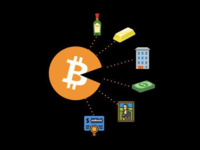Bitcoin will Eat Everything
04/10/2021
Between 1990 and 2000 the Internet went from zero to really big numbers. During this period it had its fastest growth, growing at 63% a year. It had the fastest adoption compared to anything before it in history. Then the dotcom crash came and everyone said it was the end of the Internet. But actually, it was not the end, but only the beginning. It gave birth to billion and trillion-dollar companies like Amazon, Google Twitter, Facebook and Uber, and a few others. At the end of the month, bitcoin will have its 13th birthday, and crypto’s numbers are around the same number of users the Internet had in 1997. Depending on the source you look at, crypto is between 150 and 200 million users. It’s growing at 120% a year. That’s double the adoption rate of the Internet. That’s hockey stick growth. We are looking at over one billion people in the next three years and 3.5 billion people by 2027. That’s half the world’s population by the end of the decade. That is truly extraordinary!
“Software is eating the world,” wrote venture capitalist Marc Andreessen in 2011. At the time, Marc posited the idea that all companies must in essence become software companies to compete in the rapidly evolving technological landscape that was to be the 2010’s. Not only did Andreessen accurately categorize the prevailing “creative disruption” at the time, but he also effectively predicted the economic takeover of disruptive, software-first tech giants such as Uber, Airbnb, and Salesforce. Again, it is not surprising to me that Andreessen Horowitz was one of the earliest believers in bitcoin, the largest investors in the space, and the first investors in Coinbase.
At the end of June, venture capital firm Andreessen Horowitz launched a $2.2 billion crypto ETF. Their team has expanded substantially in just a year. A letter to investors argued that “we would be remiss to ignore a now $2 trillion cryptocurrency market”.
Today, bitcoin and other cryptocurrencies are mostly used as a store of value, and they are not widely used as a payment method, at least not yet, because of their volatility. Cryptocurrency is seen as a hedge against inflation and currency depreciation by investors. However, recent indicators suggest that the industry is maturing and that digital currencies will eventually replace the existing fiat paradigm.
The world’s central banks have increased their money production in response to the coronavirus epidemic. A $1.9 trillion stimulus package may soon infuse the US economy with ultra-easy credit and massive government expenditure, a formula for short-term currency inflation. Investors are flocking to bitcoin, as fiat offers near-zero returns or negative interest rates. Cryptocurrency’s growth is a reflection of an indisputable worldwide trend.
For the time being, the US dollar remains untouchable as the world’s reserve currency, with over 80% of global trade based on dollars. However, the history of fiat currencies has always followed the same downward path: currency debasement, inflation, and a loss of trust in institutions all lead to a point when they lose their value.
Millennials are driving the bitcoin economy and millennials have no trust in institutions. They trust institutions implicitly in some ways, but when it comes to finance they don’t because 9/11, the 2008 financial crisis, and now the pandemic. How can you trust institutions when your parents lost their houses and jobs in the 2008 crisis? They also are digital natives and grew up on social media. While there is lots of noise online, there is a lot of quality of information on Twitter, Reddit, even on TikTok. People are trying to help each other because of network effects. The more people you bring more into the network, the value goes up for everyone.
Bitcoin is a network of value that sits above the internet that connects all of this digital world in a way that the value is transferable, storable, ownable, recordable. Social media gave us a people and information layer, but crypto builds a value layer on top that is peer-to-peer and controlled by that peer group. This is an important reason leading to increased adoption and growth.
But more importantly, Bitcoin is a huge breakthrough because it introduced a new business model. Fifteen years ago, the network business models of Facebook, Google, and Twitter created a network of people that were incentivized to post, share, and like. The users of those networks got the benefit of finding our old school friends and keeping in contact with relatives and other things we use social networks for. The companies and their shareholders got rich, but we didn’t. In fact, they took our data and used behavioral economics to monetize our eyeballs and our attention.
Then comes bitcoin in 2008, and suddenly you have a radical shift in this model. Bitcoin started a whole new process. Now, you’ve got a network where the users of the network are incentivized to grow the network and earn bitcoin. As we realized the business model of tokens, network effects, and that the technological benefits work for almost everything and we saw the rise of NFTs, DeFi, and social tokens.
Scarcity drives prices, whether we talk about watches or guitars, wine or cars, paintings or sculptures—all physical assets. Making digital assets used to mean it could be copied for free. Not anymore. Bitcoin can be verified, divided, re-assembled, stored, and transported at virtually no cost. It’s the perfect scarce digital asset. All that’s required to keep the network running is allocating the cheapest electricity in the world. Electricity secures the network. Not trusted parties or people with guns are needed. I call that progress.
Like gold, bitcoin has the ability to protect us against politicians who have the power to destroy our monetary base. Is that really necessary, you might ask? Strike up a conversation with a Turkish worker the next time you are on vacation and ask how it feels to have your currency depreciate by almost 50 percent against the dollar in a single year. It has happened, it happens, and will happen again.
We’re just at the dawn of the digital currency revolution. Facebook’s Diem project is expected to launch this year, and will likely introduce a huge chunk of Facebook’s 2.7 billion global users to the market. At a state level, the Chinese government is taking steps to become the first country to implement its own unlimited-supply digital currency, a move that would send shockwaves across global trade. The EU has also announced plans for a digital Euro
Many argue that governments may ban bitcoin, or that new regulation will destroy it. While it would require near global coordination, which seems impossible, we cannot ignore that the bans could cause friction for adoption, like China banning of exchanges to limit people’s ability to buy or sell and make the asset less attractive. But the truth is that regulators are terrified because there is a lot at stake and they don’t know what to do. But governments don’t want to shut it down, they just want to slow it down, even China. How do you regulate things like DAOs and decentralized exchanges? You regulate on-ramps and off-ramps, which is the big reason that central banks are building CBDCs. They’re interested in collecting taxes. The smaller a black economy is, the bigger tax revenues become. And God knows they need them with all this money printing.
The direction is clear: finance will be disrupted as surely as fossil fuels will be. Bitcoin is going to be on the right side of history. For the skeptics, I will quote George Bernhard Shaw, the Nobel winning playwright: “progress is impossible without change, and those who cannot change their minds cannot change anything.”
Ilias Louis Hatzis is the founder and CEO at Kryptonio wallet. Create your wallet in less than a minute, without seed phrases, private keys, passwords or documents. Keep your bitcoin and digital assets always secure and recoverable: https://kryptonio.com
I have no positions or commercial relationships with the companies or people mentioned. I am not receiving compensation for this post.




